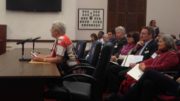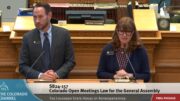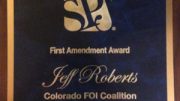By Jeffrey A. Roberts
CFOIC Executive Director
To prepare for a public bargaining session this coming Monday, representatives of the Jefferson County School District and the Jefferson County Education Association have been meeting behind closed doors in small “working groups” to come up with recommendations.
This raises a question. How is it OK for these negotiators to meet privately? Didn’t 70 percent of Colorado voters last Election Day approve Proposition 104, requiring open collective bargaining negotiations in Colorado school districts?
Here’s how the ballot question was phrased: “Shall there be a change to the Colorado Revised Statutes requiring any meeting of a board of education, or any meeting between any representative of a school district and any representative of employees, at which a collective bargaining agreement is discussed to be open to the public?”
Amy Weber, the school district’s human resources director, said that under the Open Meetings Law, “so long as we don’t have more than two district representatives participating in a working group, the meeting doesn’t have to be public.”
The small-group meetings, she added, are forums “to generate ideas,” not negotiating sessions. “We have a lot to do. Our entire contract is open for negotiations,” Weber said. “Our board (of education) has said that we effectively need a blank slate, we need a fresh start and to rethink the entire contract. With the sheer volume of work to accomplish, we think having groups to generate options is an effective way to do that.”
It’s true that for local public bodies (such as a school board), Colorado’s Open Meetings Law, aka the Sunshine Law, only applies to meetings of three or more members or a quorum, whichever is fewer. Proposition 104 amended the “local public body” definition in the Sunshine Law to include “members of a board of education, school administration personnel, or a combination thereof who are involved in a meeting with a representative of employees at which a collective bargaining agreement is discussed.”
Media lawyer Steve Zansberg, an expert in the Open Meetings Law and president of the Colorado Freedom of Information Coalition, said the language in the new statute is “ambiguous” and can be interpreted two ways:
“On one hand,” Zansberg said, “it is possible that the law merely meant to add members of school administration to the definition of a school board for purposes of its quorum requirement, so a meeting of less than three members of that expanded body does not constitute a quorum.” This interpretation supports Jeffco’s contention that Proposition 104 doesn’t cover meetings involving only two school district representatives.
Alternatively, however, “Proposition 104 defines a local public body as any group that meets with representatives of the teachers union to discuss a labor contract, regardless of how small a group attend the meeting,” Zansberg said. “Under the latter interpretation, there can be no meeting of two members of the school board or its administration with union representatives that is not conducted in the open.”
So what did the main proponent of Proposition 104, the Independence Institute, intend it to cover?
Jon Caldara, president of the free-market think tank (a CFOIC member organization), said Proposition 104 is about the negotiation process, not the number of negotiators who are present at a meeting.
“If it was just one negotiator on each side, that should still be open to the public,” Caldara said. “Otherwise, it would be too easy to skirt, which is what I think (Jeffco) is trying to do.”
He added, “I don’t know how any person can look at this and not think it’s at least violating the spirit of transparency.”
Weber said everything discussed in the working group meetings will be addressed in the public negotiating sessions that begin at 4 p.m. on Monday, April 13. The sessions will be streamed live.
Follow the Colorado Freedom of Information Coalition on Twitter @CoFOIC. Like CFOIC’s Facebook page. Do you appreciate the information and resources provided by CFOIC? Please consider making a tax-deductible donation.




